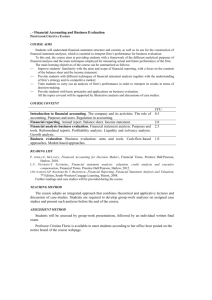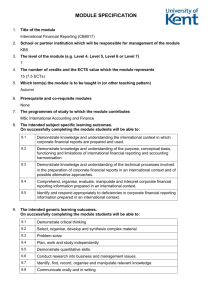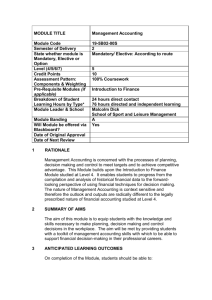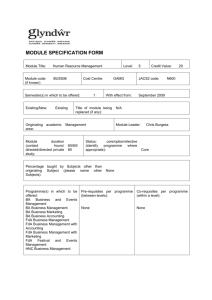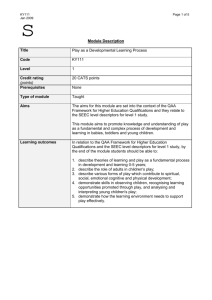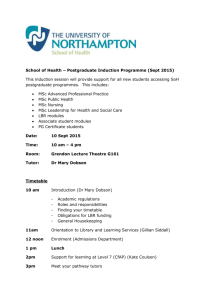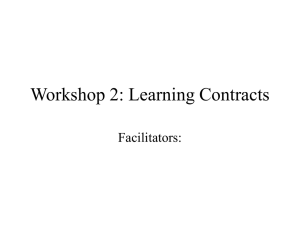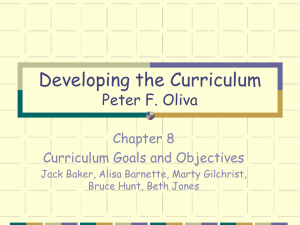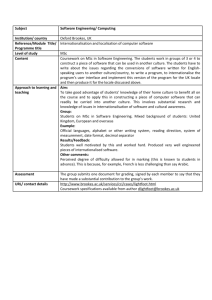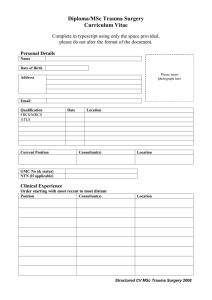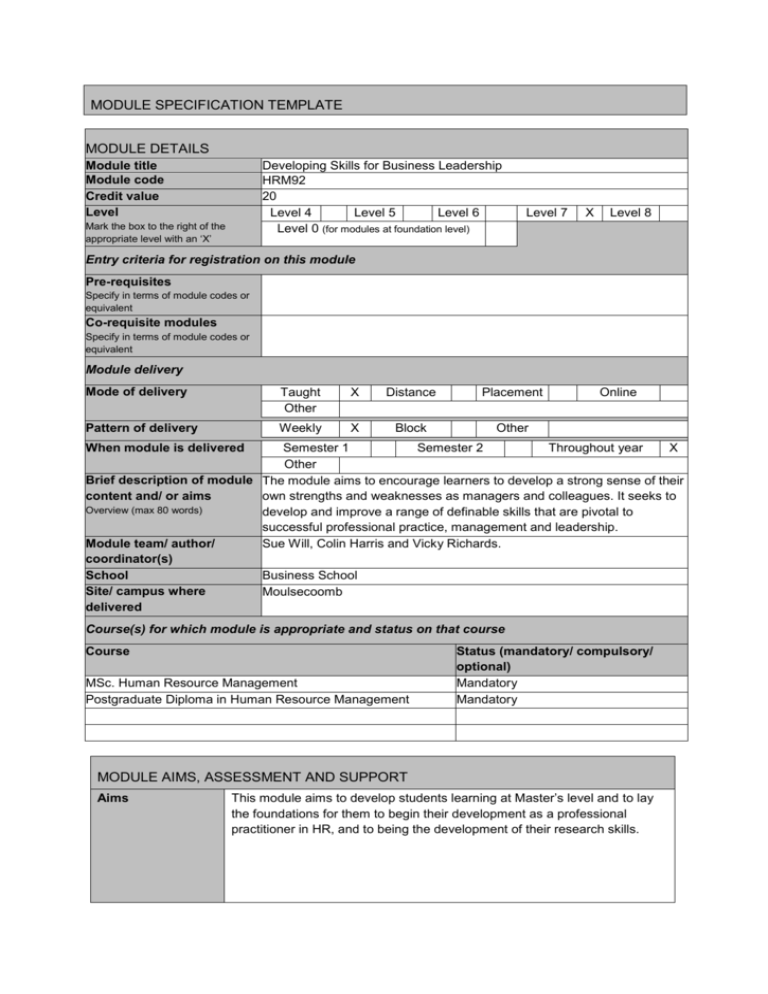
MODULE SPECIFICATION TEMPLATE
MODULE DETAILS
Module title
Module code
Credit value
Level
Developing Skills for Business Leadership
HRM92
20
Level 4
Level 5
Level 6
Level 0 (for modules at foundation level)
Mark the box to the right of the
appropriate level with an ‘X’
Level 7
X
Level 8
Entry criteria for registration on this module
Pre-requisites
Specify in terms of module codes or
equivalent
Co-requisite modules
Specify in terms of module codes or
equivalent
Module delivery
Mode of delivery
Taught
Other
X
Distance
Placement
Pattern of delivery
Weekly
X
Block
Other
Online
When module is delivered
Semester 1
Semester 2
Throughout year
X
Other
Brief description of module The module aims to encourage learners to develop a strong sense of their
content and/ or aims
own strengths and weaknesses as managers and colleagues. It seeks to
Overview (max 80 words)
develop and improve a range of definable skills that are pivotal to
successful professional practice, management and leadership.
Module team/ author/
Sue Will, Colin Harris and Vicky Richards.
coordinator(s)
School
Business School
Site/ campus where
Moulsecoomb
delivered
Course(s) for which module is appropriate and status on that course
Course
MSc. Human Resource Management
Postgraduate Diploma in Human Resource Management
Status (mandatory/ compulsory/
optional)
Mandatory
Mandatory
MODULE AIMS, ASSESSMENT AND SUPPORT
Aims
This module aims to develop students learning at Master’s level and to lay
the foundations for them to begin their development as a professional
practitioner in HR, and to being the development of their research skills.
Learning outcomes
Subject Specific:
On completion of this module, learners will be able to analyse and critically
evaluate their own performance against the following learning outcomes:
1. Demonstrate competence in postgraduate study skills including
academic writing.
2. Manage themselves more effectively at work or in another professional
context.
3. Manage interpersonal relationships at work more effectively.
4. Make sound and justifiable decisions and solve problems more
effectively.
5. Lead and influence others more effectively.
6. Demonstrate enhanced IT proficiency.
7. Demonstrate an essential people management skill-set.
Cognitive:
1. Review a range of data to help facilitate personal skill development
2. Summarise and justify personal skill development in the key learning
outcomes
3. Analyse and discuss personal skill acquisition with their line manager or
tutor
4. Produce evidence based conclusions and recommendations on aspects
of personal skill development.
Content
Indicative content is provided for each learning outcome. This is
neither prescriptive nor exhaustive but should enable achievement of
the learning outcomes. This wording is taken from the professional
body.
1. Demonstrate competence in postgraduate study skills
Accessing and evaluating published research evidence, critical thinking,
self-reflection, developing and justifying original arguments, referencing
the work of others, effective essay and report-writing; effective revision
and examination preparation.
2. Manage themselves more effectively at work or in another
professional context.
Self-awareness, dimensions of personality and individual differences,
developing resilience, time management, personal organising skills,
stress management; principles of continuous professional development;
professional and ethical approaches to self-management at work.
3. Manage interpersonal relationships at work more effectively.
Characteristics of effective teams and team-building, assertiveness,
influencing skills, interpersonal communication, effective negotiation,
handling emotion and conflict, written, verbal and non-verbal
communication, networking, negotiating; organisational politics and the
need to act in a politically astute and ethical manner to secure HR
objectives; impression management and liaising with customers.
4. Make sound and justifiable decisions and solve problems more
effectively.
Systematic and evidence-based decision-making, testing ideas, creative
and team-based decision-making, evaluating evidence and options,
ethical decision-making; communicating and justifying decisions;
proactive approaches to problem-solving; consulting skills.
5. To critically assess how to lead and influence others more
effectively.
Effective supervision and team leadership, coaching and mentoring,
effective delegation, resolving conflict between team members,
positively motivating others to raise their level of performance; chairing
meetings and co-ordinating discussions; leading and facilitating change;
providing direction; influencing thinking and decision-making on the part
of others.
6. Demonstrate enhanced IT proficiency.
Information-handling skills, commonly used IT applications and software
packages, statistical techniques and the presentation of statistical data.
7. Demonstrate an essential people management skill-set.
Selection interviewing, appraisal interviewing, disciplinary interviewing;
delivering training, making presentations; project management;
managing poor performance (including absence, lateness and
incompetence).
Learning support
Studies are supported by tutors, studentcentral (or equivalent VLE), Student
Support (as needed) and the physical and online resources of the library.
Indicative reading – most recent editions of:
Core text(s)
Watson, G. & Reissner, C. Developing Skills for Business Leadership.
London: CIPD publications
Other recommended reading
Bedford, D. and Wilson, E. Study Skills for Part time Students. Harlow:
Pearson Longman.
Burns, T. and Sinfield, S. Essential Study Skills. The complete guide to
success at university. London: Sage.
Cameron, S. The MBA Handbook, Skills for Mastering Management.
Harlow: Financial Times Prentice Hall.
Cottrell, S. Critical Thinking Skills. Basingstoke: Palgrave Macmillan
Cottrell, S. The Study Skills Handbook. Basingstoke: Palgrave Macmillan
Goleman, D, Working with Emotional Intelligence. London: Bloomsbury
Paperbacks.
Guirdham, M: Interpersonal Skills at Work. Harlow: Prentice Hall.
Horn, R. The Business Skills Handbook. London: CIPD.
Levin, P. Sail Through Exams! Maidenhead: Open University Press.
Levin, P. Successful Teamworking. Maidenhead: Open University Press.
McMillian, K. & Weyers, J. How to write Dissertations & Project Reports.
Harlow: Pearson Prentice Hall.
McMillian, K. & Weyers, J. How to succeed in Exams & Assessments.
Harlow: Pearson Prentice Hall.
Pedler, M. & Boydell, J. Managing Yourself. Maidenhead: Lemos and Crane
Price, G. Maier, P. Effective Study Skills Unlock Your Potential. Harlow:
Pearson Prentice Hall.
Recommended websites include:
Chartered Institute of Personnel and Development http://www.cipd.co.uk/
Teaching and learning activities
Details of teaching
and learning
activities
The taught content of the programme will be delivered in a phased
approach starting in the first two weeks of the MSc Personnel &
Development. Further sessions will be scheduled as appropriate
throughout the first and second semester. Delivery will be through a series
of skills workshops, diagnostic tests, hand outs, self-managed learning
activity and tutor support. The module will also be supported by and
integrated with other modules in the first & second year of the MSc
Personnel and Development. The module contains a high proportion of
diagnostic and formative assessment.
Allocation of study hours (indicative)
Study hours
Where 10 credits = 100 learning hours
SCHEDULED
40
This is an indication of the number of hours students can expect to spend
in scheduled teaching activities including lectures, seminars, tutorials,
project supervision, demonstrations, practical classes and workshops,
supervised time in workshops/ studios, fieldwork, external visits, and
work-based learning.
GUIDED
INDEPENDENT
STUDY
PLACEMENT
160
All students are expected to undertake guided independent study which
includes wider reading/ practice, follow-up work, the completion of
assessment tasks, and revisions.
The placement is a specific type of learning away from the University that
is not work-based learning or a year abroad.
TOTAL STUDY HOURS
200
Assessment tasks
Details of
assessment for
this module
All students are required to generate a portfolio / e-portfolio that will
demonstrate their level of competence and development of skills in the
learning outcomes shown above. Evidence will demonstrate skills
acquisition and improvement alongside observed skills activity.
The portfolio will be introduced at the start of the MSc P&D and assessed on
completion of the first year. Evidence for the portfolio will be accumulated
during the year as an on-going activity. Evidence to meet the various
learning outcomes can be obtained from either the students place of work or
from activities undertaken as part of their MSc studies. The evidence of skill
acquisition can take a variety of different forms. It may be the notes or
agenda from a series of meeting the student has chaired or the notes from
holding a disciplinary interview or selection interview. It could also include
signed testimonials from the student’s employer, work colleagues, clients or
customers.
The extent and range of the evidence required will be discussed at the start
of the programme and shown in the guidance notes that will accompany the
module. Along with the evidence to support each element of the skills based
learning outcomes will be a requirement to reflect on how the skill has been
developed. This self-reflection activity also aims to show how the application
of skills has been made towards professional practice.
Students will receive both formative and summative assessment which will
be based upon the submission of 100% course work activity aimed at
assessing their acquisition of Higher Education learning skills. Alongside the
production of written coursework students may also be required to
undertake some practical assessment, for example, in such areas as
presentation skills, debating skills and consultancy skills.. Students will be
encouraged to integrate their learning skills into the subject area throughout
the module. The total written content will be up to a maximum of 4000
words. It is recognised that due to the nature of assessment by portfolio / eportfolio content will vary from student to student.
Types of assessment task1
% weighting
Indicative list of summative assessment tasks which lead to the award of credit or which are required
for progression.
(or indicate if
component is
pass/fail)
WRITTEN
Written exam
COURSEWORK
Written assignment/ essay, report, dissertation, portfolio, project output,
set exercise
PRACTICAL
Oral assessment and presentation, practical skills assessment, set
exercise
100%
EXAMINATION INFORMATION
Area examination board
MSc Human Resource Management
Refer to Faculty Office for guidance in completing the following sections
External examiners
Name
Position and institution
Date appointed
Date tenure
ends
Refer to Studentcentral (or equivalent VLE)
QUALITY ASSURANCE
Date of first approval
2010
Only complete where this is not the
first version
Date of last revision
2010
Only complete where this is not the
first version
Date of approval for this
version
December 2012
Version number
2
Modules replaced
HRM72&HRM76
Specify codes of modules for which
this is a replacement
Available as free-standing module?
1
Yes
No
Set exercises, which assess the application of knowledge or analytical, problem-solving or evaluative skills, are included
under the type of assessment most appropriate to the particular task.
X

